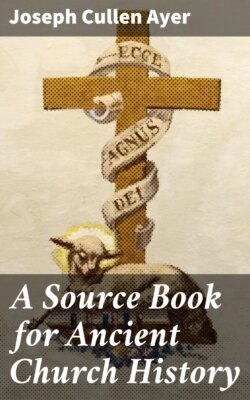Читать книгу A Source Book for Ancient Church History - Joseph Cullen Ayer - Страница 92
На сайте Литреса книга снята с продажи.
(e) Irenæus, Adv. Hær., I, 7, 15; I, 8, 23. (MSG, 7:517, 528.)
ОглавлениеThe division of mankind into three classes, according to their nature and consequent capacity for salvation, is characteristic of the Valentinian Gnosticism. The other Gnostics divided mankind into two classes: those capable of salvation, or the pneumatics, or Gnostics, and those who perish in the final destruction of material existence, or the hylics. Valentinus avails himself of the notion of the trichotomy of human nature, and gives a place for the bulk of Christians, those who did not embrace Gnosticism; cf. Irenæus, ibid., I, 6. Valentinus remained long within the Church, accommodating his teaching as far as possible, and in its exoteric side very fully, to the current teaching of the Church. The doctrine as to the psychics, capable of a limited salvation, appears to be a part of this accommodation.
[pg 093]
I, 7, 5. The Valentinians conceive of three kinds of men: the pneumatic [or spiritual], the choic [or material],45 and the psychic [or animal]; such were Cain, Abel, and Seth. These three natures are no longer in one person, but in the race. The material goes to destruction. The animal, if it chooses the better part, finds repose in an intermediate place; but if it chooses the worse, it, too, goes to the same [destruction]. But they assert that the spiritual principles, whatever Acamoth has sown, being disciplined and nourished here from that time until now in righteous souls, because they were sent forth weak, at last attain perfection and shall be given as brides46 to the angels of the Saviour, but their animal souls necessarily rest forever with the Demiurge in the intermediate place. And again subdividing the animal souls themselves, they say that some are by nature good and others are by nature evil. The good are those who become capable of receiving the seed; the evil by nature, those who are never able to receive that seed.
I, 8, 23. The parable of the leaven which the woman is said to have hid in three measures of meal they declare manifests the three kinds of men: pneumatic, psychic, and the choic, but the leaven denoted the Saviour himself. Paul also very plainly set forth the choic, the psychic, and the pneumatic, saying in one place: “As is the earthy [choic] such are they also that are earthy” [I Cor. 15:48]; and in another place, “He that is spiritual [pneumatic] judgeth all things” [I Cor. 2:14]. And the passage, “The animal man receiveth not the things of the spirit” [I Cor. 2:15], they affirm was spoken concerning the Demiurge, who, being psychic, knew neither his mother, who was spiritual, nor her seed, nor the Eons in the pleroma.
